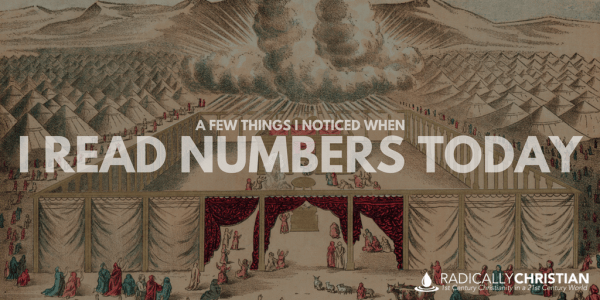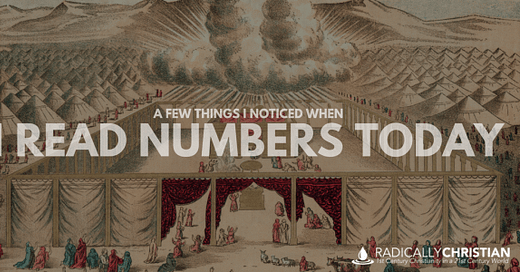A Few Things I Noticed When I Read Numbers Today
We call it “Numbers,” but the Jews call it, “In the Wilderness.” I much prefer their title. The title “Numbers,” makes it sound like the book is just about the censuses that were taken; it is so much more than that. As you know, I am reading each book of the Bible in one sitting. Here are a few of my thoughts after reading the book of Numbers.

God’s Wrath
One of the major themes of this book seems to be the wrath of God. Israel makes God angry over and over and over again. They are punished (severely) several times throughout the book. Thousands of Israelites die because of their sins.
But one thing I noticed was the distinction God made between unintentional and intentional sins. Even in the midst of His anger and wrath, God was providing ways for His people to find forgiveness when they unintentionally strayed. But He also “cut off” from His people those who did not trust Him and “high handedly” rebelled against Him.
God understands and sympathizes with human weakness and frailty, but He will not tolerate open rebellion in the midst of His camp.
God’s Covenant Faithfulness
Even though Israel proved to be a stubborn and rebellious people, God did not abandon them during their 40 years of wilderness wandering. He did not destroy them and start over (even when He wanted to do just that). He stuck with Israel. He made a promise to them and He would keep His promise no matter the cost.
This becomes a central theme to the entire Bible. In fact, the book of Romans highlights this theme. In spite of people’s unfaithfulness, God is always faithful to the promises He makes. He always does what He says He will do.
The Promised Land
As I said in a previous post, the land (or the earth) is a prominent character in the Bible. Unfortunately, we have a tendency to assume God is all about non-material things and that it is only silly humans who care about material things like pieces of property. But the truth is, God is also very concerned about material things.
God wants to give the land to His people as a perpetual inheritance.
God wants His people to experience the fruitful blessings of the land.
God wants the land to be undefiled with violence.
And above all, God wants to dwell in the land with His people.
The Bible is a very “earthy” book. The theme is never, “Don’t be concerned about material things because material things are just an illusion.” That is Buddhism, not Christianity. In the Bible, and particularly now the book of Numbers, the theme is: “The earth shall be filled with the glory of the Lord” (Numbers 14:20).
God Has Not Changed
During their wandering, the people were cursed because of their disbelief and rebellion. But in His mercy, God instructed Moses to lift up a bronze serpent so that anyone who looked upon it would be healed. Jesus said,
“Just as Moses lifted up the snake in the desert, in the same way the son of man must be lifted up, so that everyone who believes in him may share in the life of God’s new age.”
John 3:14-15, The Kingdom New Testament
Look upon Jesus in obedient faith and you will receive a life for the age to come. That is the promise of the Gospel. The same God who lifted the curse in the wilderness and brought His people into the Promised Land is lifting our curse and will bring to us our inheritance.
God wiped away the old world and gave Noah a new world through the flood. God wiped away the old land of Canaan and gave Israel a new land through the conquest. He will also wipe away the old world of sin and death and give us “a new heavens and a new earth in which righteousness dwells” (see 2 Peter 3:13). Our inheritance is being stored up for us and the God who does not change will deliver on all of His promises.
I love you and God loves you,
Wes McAdams
P.S. If you’ve missed the other posts in this series, you can find them here:
The post A Few Things I Noticed When I Read Numbers Today appeared first on Radically Christian.




